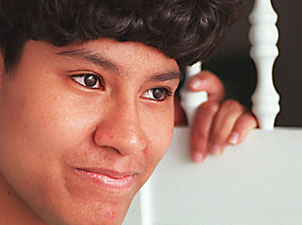 |

Sarah Moretz
![]() Born in a hospital in Albuquerque, N.M., Moretz was full term, yet weighed only 4 1/2 pounds - about 3 pounds less than she should have.
Born in a hospital in Albuquerque, N.M., Moretz was full term, yet weighed only 4 1/2 pounds - about 3 pounds less than she should have.
![]() Doctors knew immediately she had FAS.
Doctors knew immediately she had FAS.
![]() Moretz's head is too small, and she has suffered seizures. Without contacts or glasses, she is legally blind. And she needed extensive orthodontic work to repair an improperly formed jaw.
Moretz's head is too small, and she has suffered seizures. Without contacts or glasses, she is legally blind. And she needed extensive orthodontic work to repair an improperly formed jaw.
![]() For the first two years of her life, Moretz lived off and on with her birth mother.
For the first two years of her life, Moretz lived off and on with her birth mother.
![]() "She was really living in horrible conditions," Isambert said. "Her house was roach-infested and rat-infested. Her older brothers were the ones taking care of her while her mother was off drinking."
"She was really living in horrible conditions," Isambert said. "Her house was roach-infested and rat-infested. Her older brothers were the ones taking care of her while her mother was off drinking."
![]() When Moretz was 2, her mother died of cirrhosis of the liver and tuberculosis. Moretz moved in with elderly foster parents who adored her.
When Moretz was 2, her mother died of cirrhosis of the liver and tuberculosis. Moretz moved in with elderly foster parents who adored her.
![]() Isambert and her then-husband were living in Alamogordo. "I wanted a little girl very badly, and that's how we got Sarah."
Isambert and her then-husband were living in Alamogordo. "I wanted a little girl very badly, and that's how we got Sarah."
![]() Moretz came to live with the family at age 3.
Moretz came to live with the family at age 3.
![]() "She was not potty trained, she was still on a bottle, she knew about five words, and she had no discipline whatsoever," Isambert said. "She was like a wild child. She was so hyperactive, she was hanging off the ceiling."
"She was not potty trained, she was still on a bottle, she knew about five words, and she had no discipline whatsoever," Isambert said. "She was like a wild child. She was so hyperactive, she was hanging off the ceiling."
![]() The couple, who had three sons of their own and an adopted son, took Sarah in as their own.
The couple, who had three sons of their own and an adopted son, took Sarah in as their own.
![]() But, as is common in families that adopt FAS children, the couple divorced. The stress of raising a difficult child can end relationships, Isambert said.
But, as is common in families that adopt FAS children, the couple divorced. The stress of raising a difficult child can end relationships, Isambert said.
![]() In 1988, Isambert and her new husband moved to Tucson with the children.
In 1988, Isambert and her new husband moved to Tucson with the children.
![]() Isambert said she "runs a tight ship" and that Moretz' life has always been highly scheduled.
Isambert said she "runs a tight ship" and that Moretz' life has always been highly scheduled.
![]() "I don't think she would have survived without it," she said.
"I don't think she would have survived without it," she said.
![]() When Isambert adopted Moretz in 1980, she thought she was an expert on FAS. As a foster mom, she had cared for many children with the syndrome. "Seventeen years later, I'm not such an expert," she said.
When Isambert adopted Moretz in 1980, she thought she was an expert on FAS. As a foster mom, she had cared for many children with the syndrome. "Seventeen years later, I'm not such an expert," she said.
![]() She said little is known about how to help adults with FAS.
She said little is known about how to help adults with FAS.
![]() "Nobody knows what to do with these kids, who are now young adults," she said. "At the time we adopted Sarah, we didn't know what the long-term effects would be.
"Nobody knows what to do with these kids, who are now young adults," she said. "At the time we adopted Sarah, we didn't know what the long-term effects would be.
![]() "We were told she had FAS and was speech delayed and developmentally delayed, but I thought she could be independent. But she'll always have to have supervision. There's no way she could live independently and be safe."
"We were told she had FAS and was speech delayed and developmentally delayed, but I thought she could be independent. But she'll always have to have supervision. There's no way she could live independently and be safe."
![]() Keeping Moretz safe is nearly a full-time job, Isambert said.
Keeping Moretz safe is nearly a full-time job, Isambert said.
![]() "We really have to watch out for her so no one will take advantage of her."
"We really have to watch out for her so no one will take advantage of her."
